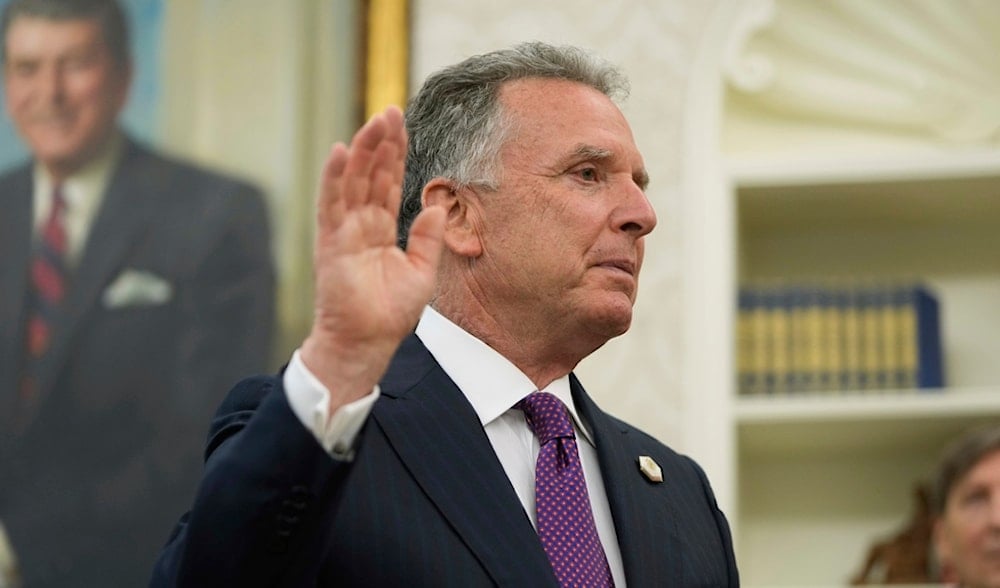US Envoy meets Israeli officials ahead of indirect Iran nuclear talks
US envoy Steve Witkoff met with Israeli officials in Rome before resuming indirect nuclear talks with Iran, amid tensions over uranium enrichment and sanctions relief.
-

Steve Witkoff is sworn as special envoy by Secretary of State Marco Rubio during a ceremony in the Oval Office of the White House with President Donald Trump, Tuesday, May 6, 2025, in Washington (AP)
US Special Envoy Steve Witkoff met with top Israeli officials in Rome ahead of a new round of indirect US-Iran nuclear talks, according to a report by Axios on Friday. The meetings included Israeli Strategic Affairs Minister Ron Dermer and Mossad director David Barnea.
The discussions come as the United States prepares for renewed talks with Iran over its nuclear program amid persistent diplomatic tensions.
According to Israeli sources cited by Axios, Dermer and Barnea are seeking to closely coordinate with Washington and be briefed immediately after the discussions, an indication of "Israel's" discomfort with being sidelined in negotiations that could affirm Iran's sovereign right to peaceful nuclear technology.
CNN and Axios have both reported that "Israel" is drawing up plans for a rapid military strike against Iranian nuclear sites if negotiations break down. One Israeli official told Axios that the "operational window for a successful strike could close soon," suggesting that "Israel" is considering "preemptive action" to obstruct Iran’s sovereign and peaceful nuclear program, despite the absence of any legal basis for such aggression.
Iran warns UN of retaliation
In a formal letter to the United Nations, Iranian Foreign Minister Abbas Araghchi issued a stern warning against any Israeli attack on Iran's nuclear facilities, vowing a decisive response and holding the United States legally responsible for any escalation.
Addressed to UN Secretary-General António Guterres, the President of the Security Council, and the head of the International Atomic Energy Agency (IAEA), the letter accuses the Israeli regime of issuing repeated threats that violate international law and pose a direct challenge to regional and global peace.
"In the face of any threat or unlawful action, the Islamic Republic of Iran will respond with determination," Araghchi wrote. "Iran will take all necessary measures to defend its people, interests, and infrastructure from terrorist or sabotage activities, in accordance with international law."
Araghchi argued that the Israeli leadership's open discussion of targeting Iran's nuclear sites represents a grave breach of the UN Charter. He called on the UN Security Council to take "urgent and effective" action to confront Tel Aviv's "reckless and destabilizing conduct."
Fifth round of indirect US-Iran talks
According to Iranian media outlet Tasnim, the fifth round of indirect talks between Washington and Tehran, mediated by Oman, commenced Friday in Rome. Steve Witkoff is leading the US delegation, while Iranian Foreign Minister Abbas Araghchi heads the Iranian team.
Points of disagreement
The talks take place under heightened strain, with the two sides expressing diverging views on the nuclear issue. On Sunday, Witkoff stated that any agreement would not permit Iran to enrich uranium. In response, Iranian officials dismissed the expectation as "unrealistic", affirming their position on the right to uranium enrichment.
Timeline
The current round follows four prior meetings: the first and third rounds were held in Muscat on April 12 and April 26, while the second and fourth rounds took place in Rome and Muscat on April 19 and May 11, respectively.
The indirect talks began after US President Donald Trump sent a letter to Iranian Leader Sayyed Ali Khamenei in early March. The letter reportedly offered a new framework for agreement on Iran's nuclear program, while also including veiled military threats in case diplomacy failed.
Iran rejected direct talks but agreed to engage in indirect dialogue via third-party mediation.
Read more: 'Israel' threat on Iran nuclear sites lifts oil prices: CNN

 4 Min Read
4 Min Read








